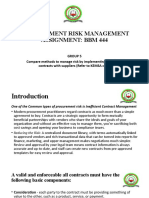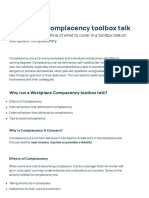Legal Consideration
Legal Consideration
Uploaded by
Unnati DixitCopyright:
Available Formats
Legal Consideration
Legal Consideration
Uploaded by
Unnati DixitOriginal Title
Copyright
Available Formats
Share this document
Did you find this document useful?
Is this content inappropriate?
Copyright:
Available Formats
Legal Consideration
Legal Consideration
Uploaded by
Unnati DixitCopyright:
Available Formats
Legal Issues to be considered in a project
Contract law, in and of itself, is a tricky legal game and it can vary from state to state. Every project management
effort needs binding and legal agreements to protect your company against litigation, whether you’re dealing with
in-house or outsourced project management.
Many project managers do not err on the side of caution, unless they’re in the building and construction industry,
and they often make verbal agreements that are unreachable. Often, employee or team theft of confidential or
proprietary information is another reason for a client to seek an attorney.
While it’s best to have a contract attorney in your state write your project management services agreement, we have
provided this example-only template of a service agreement; it should not be used in lieu of legal advice. To ensure
you have full protection from litigation, have your counsel write your service agreement. Keep in mind that you
may need to alter your services agreement per project to avoid legal issues resulting from a project you’ve
managed.
If you do have a service agreement in place, does it cover the following?
Project contract- A project will always include numerous contracts. The drafting of the project contract includes
the most of lawyer’s contribution. While contracting, he would have to go through the nature of obligations that
would arise from the contract and also, the evolution of agreements whilst making business-related decisions. After
he is done with the contractual phase, the lawyer needs to deal with the post-contractual phase as well. The post
contractual phase will include his’ and party’s hidden obligations which he needs to analyze and perform.
Project Terms – Not only should this include the timeline of the project, it should state who will manage and work
on the project. Include a change order clause as well for unforeseen expenses. Your client may request a penalty
clause if work is not completed as promised.
Outsourcing – If you need to use outside resources, vendors, and even suppliers, how will you monitor these
sources? A sub-contractor agreement with your company named as an additional insured is a must.
Imposing restrictions - In a project contract between two parties, it is common that the restrictions would be
imposed on party by another. It is the duty of the lawyer to check that the restrictions are in consonance with
Section 27 of the Indian Contract Act, 1872 which states that “Every agreement by which anyone is restrained from
exercising lawful profession, trade or business of any kind, is to that extent void”. However, exception to this can
be like not revealing secrets of the company to prevent exercise of insider trading, etc. and to preserve the goodwill
of the Company.
Communication – How much communication will there be between you and the client? If it’s weekly, indicate
that. Stick to a written communication agreement and make sure you outline if communication can be verbal or in
the form of email or faxes.
Risk Insurance – Do you have enough project or business liability insurance in case of litigation? What about
employee theft insurance? Speak to your company’s insurance broker to ensure you have enough coverage and
coverage that will pay for attorney’s fees in the event you are sued. Check with your insurance carrier as well.
Often it will provide risk management training to help you avoid unnecessary litigation.
Arbitration or Mediation Clause – Court battles and lawsuits can cost hundreds of thousands of dollars. To
prevent this, make sure your attorney includes a mediation or arbitration clause. This forces both parties to enter
into an outside court source to solve the dispute. While it’s not free to mediate, it is certainly less costly.
Also, it must be added that which law would govern either parties in cases like, if both the contracting parties are
foreign entities or either of them is and such other cases. It is also vital to decide the jurisdiction beforehand in case
anyone approaches the Court.
You might also like
- Selling Your Condominium in ThailandDocument4 pagesSelling Your Condominium in Thailandsaranakom cheecharoenNo ratings yet
- Importance of Contract Law in Our Day To Day BusinessDocument6 pagesImportance of Contract Law in Our Day To Day BusinessShamim Nirjhor100% (1)
- Introduction To Security: A. Security in General 1. Definition of SecurityDocument7 pagesIntroduction To Security: A. Security in General 1. Definition of SecurityDivina Dugao100% (1)
- Business ContractDocument6 pagesBusiness ContractBilal KhanNo ratings yet
- Covering Your Bases 7 Critical Contract ClausesDocument5 pagesCovering Your Bases 7 Critical Contract ClausesamedkillpicNo ratings yet
- Contract Drafting ArticleDocument8 pagesContract Drafting ArticleCG MbuguaNo ratings yet
- Writing Legal Contracts - Full GuideDocument22 pagesWriting Legal Contracts - Full GuideAhmedNo ratings yet
- Gated Content PDF Elements of A Construction ContractDocument3 pagesGated Content PDF Elements of A Construction Contractnoahyosef456No ratings yet
- Legal Terminologies in Business LawDocument13 pagesLegal Terminologies in Business LawAlberto NicholsNo ratings yet
- Paper On It & Ites Customer Contracts - Conference Paper 2013 - BharatDocument7 pagesPaper On It & Ites Customer Contracts - Conference Paper 2013 - BharatTA SrinivasenNo ratings yet
- Type of Commercial Contracts and Their VariationsDocument4 pagesType of Commercial Contracts and Their VariationsTrúc PhạmNo ratings yet
- Contract Provisions ChecklistDocument6 pagesContract Provisions ChecklistShiela Marie LopezNo ratings yet
- CariDocument7 pagesCariGels GenovaNo ratings yet
- Procurement Risk Management Assignment: BBM 444Document9 pagesProcurement Risk Management Assignment: BBM 444Hashi MohamedNo ratings yet
- Summary ContractsDocument3 pagesSummary ContractsBhagath Gottipati100% (1)
- Form of Appointment - Issue 1Document13 pagesForm of Appointment - Issue 1Kumail RizviNo ratings yet
- Business - What To Include in A Business ContractDocument5 pagesBusiness - What To Include in A Business Contractmatthew mafaraNo ratings yet
- BSM2144 Strategic Sourcing and ProcurementDocument21 pagesBSM2144 Strategic Sourcing and ProcurementTc. Mohd NazrulNo ratings yet
- Different Types of ContractsDocument14 pagesDifferent Types of ContractsesfapexsNo ratings yet
- Commercial Agreement Clauses PDFDocument7 pagesCommercial Agreement Clauses PDFSanjit SinhaNo ratings yet
- Boilerplate Terms ConrtractDocument29 pagesBoilerplate Terms ConrtractFarhad MehdiyevNo ratings yet
- Article - Legal Aspects of Project Management - by Alok Kumar (THS)Document18 pagesArticle - Legal Aspects of Project Management - by Alok Kumar (THS)Minaxi SharmaNo ratings yet
- Contract Drafting Made EasyDocument20 pagesContract Drafting Made Easycc.anubhavjoshiNo ratings yet
- Mastering Contract Management Training 2022Document218 pagesMastering Contract Management Training 2022Bryan ScofieldNo ratings yet
- RiskTransferStrategytoHelpProtectYour BusinessDocument12 pagesRiskTransferStrategytoHelpProtectYour BusinessPritipawarNo ratings yet
- Consulting Services Agreement & Guide: IncludedDocument7 pagesConsulting Services Agreement & Guide: Includednatasha0605No ratings yet
- Commercial and Legal Objectives of ContractsDocument11 pagesCommercial and Legal Objectives of ContractsTrúc PhạmNo ratings yet
- Reducing Legal Risks Through ContractsDocument44 pagesReducing Legal Risks Through ContractsLawQuestNo ratings yet
- R.P Legal LanguageDocument13 pagesR.P Legal LanguageSushanth S AnchanNo ratings yet
- Contractual Liability Risk ManagementDocument6 pagesContractual Liability Risk ManagementAmir KhosravaniNo ratings yet
- Risk Management in ContractsDocument8 pagesRisk Management in ContractsmuruganNo ratings yet
- Human Values in Design: Scientific Laws and Principles To Technical ProblemsDocument37 pagesHuman Values in Design: Scientific Laws and Principles To Technical ProblemsCholan PillaiNo ratings yet
- Contract Dispute: What Is It? Types & ExamplesDocument8 pagesContract Dispute: What Is It? Types & ExamplesLinh Le HongNo ratings yet
- Good CDDocument4 pagesGood CDKhan farazNo ratings yet
- Tech Agreements PPTDocument13 pagesTech Agreements PPTmekhala.chandrashekharNo ratings yet
- Dissertation Confidentiality AgreementDocument5 pagesDissertation Confidentiality AgreementBuyPapersForCollegeOnlineScottsdale100% (1)
- The Terminology of ContractsDocument12 pagesThe Terminology of ContractsLya HellenNo ratings yet
- Seven Tips To Draft A Balanced Contract That Speeds Up DealsDocument4 pagesSeven Tips To Draft A Balanced Contract That Speeds Up DealsjayelinesiNo ratings yet
- Personal GuaranteeDocument2 pagesPersonal Guaranteeclark_tayloruk100% (1)
- Chapter - A Newbie's Guide To Drafting Representation and Warranties PDFDocument10 pagesChapter - A Newbie's Guide To Drafting Representation and Warranties PDFShashwat DuggalNo ratings yet
- Termination of ContractDocument7 pagesTermination of Contractgie.mohamadNo ratings yet
- Limitation of Liability Provisions in EPC Contracts: Portfolio Media. Inc. - 111 West 19Document5 pagesLimitation of Liability Provisions in EPC Contracts: Portfolio Media. Inc. - 111 West 19Денис КовалевNo ratings yet
- Brokerage AgreementDocument3 pagesBrokerage AgreementAdolfo RicoNo ratings yet
- Commercial AgreementDocument14 pagesCommercial Agreementratna_p_pNo ratings yet
- Contracting ProcessDocument2 pagesContracting ProcessJayhze DizonNo ratings yet
- Commercial ManagementDocument17 pagesCommercial ManagementJames AkashNo ratings yet
- Business Law And RegulationsDocument12 pagesBusiness Law And Regulationsahmihasan90No ratings yet
- Novated ContractsDocument3 pagesNovated Contractsharry_1981No ratings yet
- List of Suppliers-06!12!2015Document13 pagesList of Suppliers-06!12!2015dhanu1308No ratings yet
- Contractual Liability Essentials Core Essentials For ClientsDocument7 pagesContractual Liability Essentials Core Essentials For ClientsAmir KhosravaniNo ratings yet
- Simplified Industry ModelDocument5 pagesSimplified Industry ModelOlawuyi OluwatamiloreNo ratings yet
- Why Is An Assignment Clause Important?Document2 pagesWhy Is An Assignment Clause Important?Sonica Dhankhar100% (1)
- The Importance of NDA For Outsourcing Offshoring and Freelance BPODocument3 pagesThe Importance of NDA For Outsourcing Offshoring and Freelance BPOMacKenzie Brown100% (2)
- Hold-Harmless or Indemnification AgreementDocument2 pagesHold-Harmless or Indemnification AgreementitargetingNo ratings yet
- Property Management Is Just Like Any Other Management ContractsDocument3 pagesProperty Management Is Just Like Any Other Management ContractsMoujeck Olayvar CabalesNo ratings yet
- Collateral WarrantyDocument4 pagesCollateral Warrantyasmr1970No ratings yet
- Canadian Business Contracts Handbook: Understand, Negotiate & Create Your OwnFrom EverandCanadian Business Contracts Handbook: Understand, Negotiate & Create Your OwnNo ratings yet
- Construction Contract: of ObjectDocument13 pagesConstruction Contract: of ObjectBikila M. KejelaNo ratings yet
- Construction Contract ChecklistDocument9 pagesConstruction Contract ChecklistVirendra PatilNo ratings yet
- 4 5951834630754669431Document27 pages4 5951834630754669431Degu BayuNo ratings yet
- ProjectDocument33 pagesProjectUnnati DixitNo ratings yet
- Bihari JiDocument2 pagesBihari JiUnnati DixitNo ratings yet
- Mehrauli Iron Pillar Inscription of ChandraDocument3 pagesMehrauli Iron Pillar Inscription of ChandraUnnati DixitNo ratings yet
- Nur JahanDocument13 pagesNur JahanUnnati DixitNo ratings yet
- Msmeannualreport2022-23english 0Document176 pagesMsmeannualreport2022-23english 0Unnati DixitNo ratings yet
- 2 Mauritius Need For Changes To Law of Evidence MR Satyajit Boolell DPP MauritiusDocument18 pages2 Mauritius Need For Changes To Law of Evidence MR Satyajit Boolell DPP Mauritius9johnsnowNo ratings yet
- Veritas College of Irosin: San Julian, Irosin, SorsogonDocument1 pageVeritas College of Irosin: San Julian, Irosin, SorsogonFortes Roberto GajoNo ratings yet
- Practice: Architects' LiabilityDocument3 pagesPractice: Architects' LiabilityANo ratings yet
- Chapter 2 Basic Concep of The Succession and WillDocument15 pagesChapter 2 Basic Concep of The Succession and WillJohn Dominic Bobis ArtiagaNo ratings yet
- Criminology AssignmentDocument11 pagesCriminology AssignmentNaman MahajanNo ratings yet
- WattpadDocument2 pagesWattpadjenf9026No ratings yet
- Just Leave Me Alone!Document25 pagesJust Leave Me Alone!Brody ChildsNo ratings yet
- Workplace Complacency Toolbox TalkDocument4 pagesWorkplace Complacency Toolbox TalkJomy JohnyNo ratings yet
- Paralegal Today The Legal Team at Work Roger Leroy Miller 2024 Scribd DownloadDocument84 pagesParalegal Today The Legal Team at Work Roger Leroy Miller 2024 Scribd Downloadgamawaiyed100% (4)
- Midterm Exams 2022Document5 pagesMidterm Exams 2022marvinNo ratings yet
- Child Abuse in India - An Analysis: Amisha U. PathakDocument12 pagesChild Abuse in India - An Analysis: Amisha U. Pathaksakshi ranaNo ratings yet
- (ICC) Model Terms of ReferenceDocument11 pages(ICC) Model Terms of ReferenceLam TranNo ratings yet
- Tle 8 Week 7Document6 pagesTle 8 Week 7Jhon Jomarie Adlawon RobasNo ratings yet
- Week 3 Ethical Codes: Spi101 - Social and Professional IssuesDocument13 pagesWeek 3 Ethical Codes: Spi101 - Social and Professional IssuesMaria Chris RoxasNo ratings yet
- Bosh Assessment 4-8Document4 pagesBosh Assessment 4-8Estelle May Beton AugustoNo ratings yet
- SYNOPSISDocument9 pagesSYNOPSISFaizan ahamedNo ratings yet
- Offer Letter-5Document5 pagesOffer Letter-5ganesh pandiNo ratings yet
- Elc270 Assessment 4 Proposal WritingDocument10 pagesElc270 Assessment 4 Proposal WritingredrianaNo ratings yet
- Goi Ching AngDocument28 pagesGoi Ching AngFateh ArinaNo ratings yet
- Indian Institute of Human Rights: Second YearDocument28 pagesIndian Institute of Human Rights: Second YearSwarubini PJNo ratings yet
- 5 BurkeDocument2 pages5 BurkeEyah LoberianoNo ratings yet
- Piedad V BobillesDocument7 pagesPiedad V BobillesAriann BarrosNo ratings yet
- 6 Ways To Protect Your Personal Information OnlineDocument3 pages6 Ways To Protect Your Personal Information Onlinedevid mandefroNo ratings yet
- Private Violence Discussion Lindsey Bonk 1Document5 pagesPrivate Violence Discussion Lindsey Bonk 1api-663317625No ratings yet
- Elective Practicum IV Case DigestsDocument15 pagesElective Practicum IV Case DigestsKarl Jason JosolNo ratings yet
- 5 10 2023 CalendarDocument9 pages5 10 2023 Calendarlimbuscompanyr12No ratings yet
- Professional Conduct and Ethical StandardsDocument18 pagesProfessional Conduct and Ethical StandardsBart VantaNo ratings yet
- Community Crime Prevention: The Case of A Barangay in The Northern PhilippinesDocument29 pagesCommunity Crime Prevention: The Case of A Barangay in The Northern PhilippinesEliseo Putis, Jr.No ratings yet
- Memo 02 ITEC INC SPPC Working Committees 2021 2022Document6 pagesMemo 02 ITEC INC SPPC Working Committees 2021 2022Lurry Jane MohinogNo ratings yet






























































































